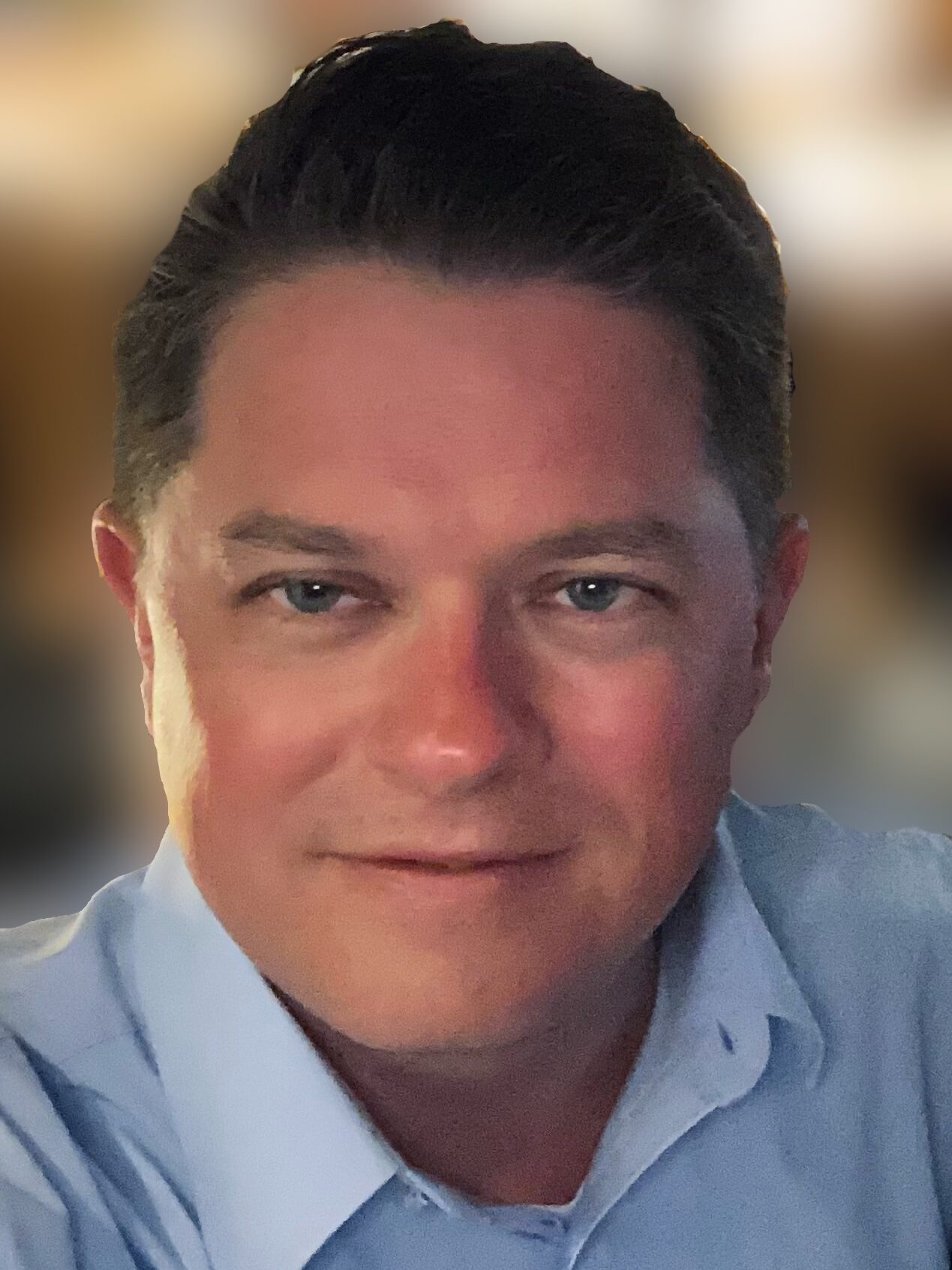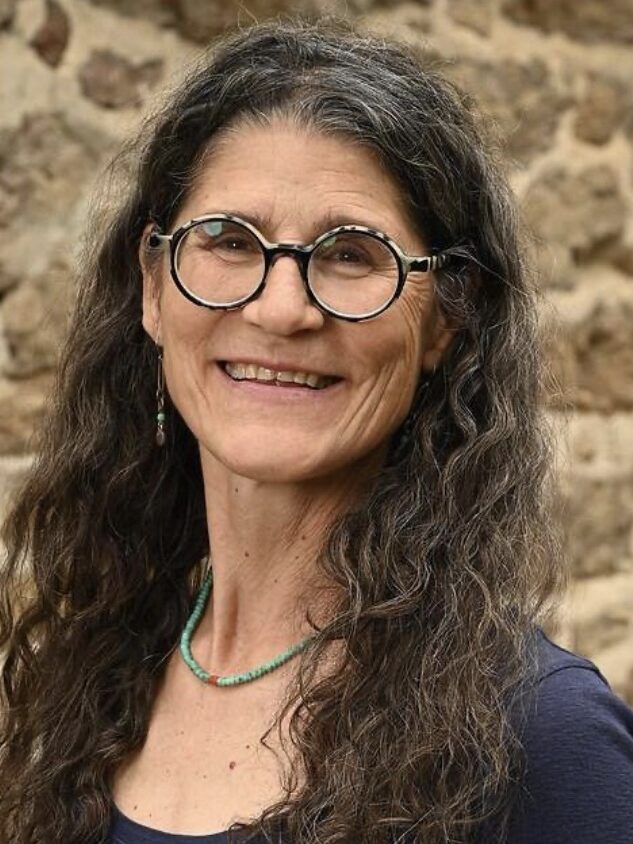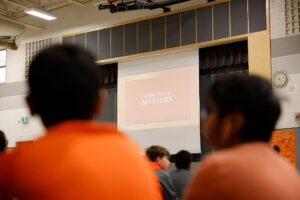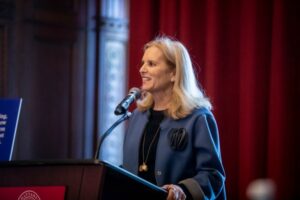To hear more from and about teachers in our Human Rights Education network, subscribe to our quarterly newsletter.
Get the latest issues of our Human Rights Education update delivered straight to your inbox.
Tags
Share
Teachers are the heart of education’s transformative power—encouraging, supporting, and guiding students to reach their full potential. This Teacher Appreciation Week, we’re amplifying the voices of educators in our Human Rights Education network. Hear what educators Joe Karb, Chris Buckley, John Terry, Lauren McCoy, Catherine Hammons, and Stephanie Thliveris have to say about:
- The challenges they face in today’s political climate
- What human rights education means to them
- Words of wisdom, hope, and solidarity for fellow educators

Joe Karb
Social Studies Teacher
Springville Middle School
What does human rights education mean to you?
Human rights education is about the idea that EVERYONE is born with human rights rights and that defending those rights is a shared responsibility.
Through the study of the UDHR and the stories Defenders, students develop a deeper understanding of key issues, build empathy for victims, and are empowered to take action.
What do you think is the biggest challenge educators face today in implementing human rights education in their curriculums?
The biggest challenge educators face is the current political climate which often marginalizes human rights education in favor of topics that are considered more “patriotic.” However, what is being missed in the current climate is that there is no topic more patriotic than standing up for justice, equality, and the basic rights of all people.
If you could share a message—advice, encouragement, or words of wisdom—with other educators across the country, what would you say?
My advice to educators is to stay the course because human rights education is more important than ever. In teaching students to value dignity, justice, and equality, you’re helping shape a generation that can create real and lasting change.

Chris Buckley
American History and Government Teacher
Brookfield High School
What does human rights education mean to you?
For me, Human Rights Education is about the empowerment of young people towards recognizing their value as members of their communities.
Beyond the importance of teaching young people about their rights and how to recognize and protect them, human rights education is about teaching young people that their contributions have value and that they can do great things. By creating learning environments in which dignity and respect are the core principles around which learning is facilitated, the future will be strong.
What do you think is the biggest challenge educators face today in implementing human rights education in their curriculums?
The biggest challenge facing human rights educators is the myth that the teaching of human rights are political and agenda driven. The teaching of human rights transcends politics and should be accessible to all students, both nationally and globally. The lack of human rights educators in the United States makes those who are interested in teaching it feel that they are doing so in isolation, which makes it difficult for the development of curriculum and course work.
If you could share a message—advice, encouragement, or words of wisdom—with other educators across the country, what would you say?
My lived experiences as a human rights educator has always been that authenticity is the key to success, both as a classroom teacher and as an advocate for students. Young people are looking for adults to believe in them. If you place your trust in students and give them meaningful responsibilities, you will find that it will be repaid with interest. One does not need to teach a human rights class in order to be a human rights educator.

John Terry
Social Studies Supervisor
New Jersey Public School District
What does human rights education mean to you?
To me, human rights education is a way to teach about issues that affect the dignity of real people – past and present – in a manner that is nonpartisan, and that has been widely accepted by the international community since after World War II.
Human rights education provides a path for people to learn about political, social, and economic issues through a human rights lens, and to use that lens to hold institutions accountable for addressing those issues. Human rights education is also a path towards empowerment and an understanding of one’s agency.
What do you think is the biggest challenge educators face today in implementing human rights education in their curriculums?
The biggest challenge educators face today is what appears to be the moving of goal posts in terms of what content is acceptable to teach in the classroom, per the divisive political rhetoric that currently exists in the U.S., as well as recent threats from those with power at the federal level. Educators are not always fully aware of the power that they do have (or sometimes do not have), despite these recent developments, in order to bring human rights education to life in their classrooms.
If you could share a message—advice, encouragement, or words of wisdom—with other educators across the country, what would you say?
When human rights become a target, it is all the more necessary to help students learn about the human rights of all people, and to teach about, for, and with human rights. If not you, who? If not now, when?

Lauren McCoy
Assistant Professor
Hunter College
Former ESL Teacher
Manhattan Academy for Arts and Language
What does human rights education mean to you?
To me, human rights education means not just teaching about human rights but also engaging students as human rights defenders.
I want my students to recognize their own power to shape the world around them. Human rights education involves forming coalitions with students, families, and community members to make change. It also means creating spaces for students to feel safe to show up as their full selves, to feel seen, heard, and valued. At its core, human rights education is grounded in care, respect, and mutual learning.
What do you think is the biggest challenge educators face today in implementing human rights education in their curriculums?
I would say one of the biggest challenges educators face today in implementing human rights education is navigating political and institutional constraints without compromising their integrity and values. Many teachers are working in environments where critical conversations are discouraged or censored and where discussing race, power, immigration, or LGBTQ+ rights is considered too controversial. This kind of silencing leads to an erasure of identities which stands in diametric opposition to what we aim to do as educators committed to justice and human rights. Another major challenge is the emotional and physical toll of the work itself. Teaching is already demanding, and in this current moment, when we’re witnessing human rights under attack, including the rights of our own students and communities, it can feel especially overwhelming. We are not only educators; we are people with bills to pay, families to care for, and health to manage, all while thinking about student safety and weighing what we can or can’t say in the classroom.
If you could share a message—advice, encouragement, or words of wisdom—with other educators across the country, what would you say?
I would share a song I heard on Instagram by musician Abigail Bengson (my class actually had the joy of seeing her perform live on an amazing field trip). Her lyrics have stayed with me ever since:
“Despair is a tool of the empire / If they exhaust us, they can keep us down. / If you feel hopeless, that’s on purpose / So honey, look around / At all of the love that’s been poured into you / That got you this far, yes / The love of all of your ancestors and the light from every star.”
I would remind teachers to keep centering joy in their practice. Prioritize building and strengthening relationships with students. Learn from and with your students. Draw strength from your colleagues and from the broader community of educators committed to human rights education—you are not alone and our work matters!

Catherine Hammons
Social Studies Teacher
Palmer Trinity Middle School
What does human rights education mean to you?
To me, Human Rights Education is the cornerstone of a just society.
As an educator, I see it as my responsibility to ensure that every student not only knows their fundamental human rights but also develops the agency and empathy to defend those rights for themselves and their community. By exploring history through the experiences of human rights defenders, my students learn that taking a stand for justice is not only possible but essential. One of the most powerful aspects of the Speak Truth to Power curriculum developed by RFK Human Rights, is how it empowers students into the role of Defenders.
What do you think is the biggest challenge educators face today in implementing human rights education in their curriculums?
The biggest challenge educators face in implementing human rights education today stems from the tension between the demands of a standardized curriculum and the complexities of a politically charged social landscape. While educators are tasked with meeting specific state standards and preparing students for testing, the crucial need to foster understanding, empathy, and a commitment to justice through human rights education can feel secondary. Furthermore, navigating the delicate and often contentious political climate surrounding these topics adds another layer of difficulty, potentially limiting open and meaningful engagement with human rights principles in the classroom. As educators who are committed to the holistic development of the student, we must find innovative and resilient ways to integrate human rights education within these existing constraints.
If you could share a message—advice, encouragement, or words of wisdom—with other educators across the country, what would you say?
Teachers, you are not alone in this vital work. Even amidst packed schedules and societal divisions, remember that every lesson, every discussion—large or small—plants in students the seeds of understanding their rights and fostering a kinder, more just world, where they advocate for justice and respect each other’s differences. Your challenging efforts are deeply meaningful and important. Keep fostering those crucial conversations, empowering the next generation of advocates. Support is out there – reach out when you need it. We are here to support you.

Stephanie Thliveris
Science and Mindfulness Teacher
Buckingham Friends School
What does human rights education mean to you?
Human rights is inherently woven into the very fabric of education, regardless of how we divide fields of study, define core subjects, or debate pedagogy.
The sciences reflect the human experience, as do the social sciences and history. Mathematics, physical education, and world languages are rooted in the actions, choices, and expressions of humanity. Everything people have done and continue to do is shaped by elements of our shared humanity. For me, it is essential that we guide our students to consider why knowledge, content, and practices matter to the human community in order to consider the world in which they live.
What do you think is the biggest challenge educators face today in implementing human rights education in their curriculums?
The need for administrative support and collegial communication are powerful assets to moving this great work forward at a pace that is greatly needed. With the support of administration, creative means to incorporate human rights education into either core subjects of fields of study is key. If the school harbors a mission and values that rest within an umbrella of human rights, the “way opens” for curricular ideas to foster and can more readily take hold. Even so, without an active body of educators from diverse communities to share experiences and frame ideas that lead to program changes in all disciplines, the build slows, and more effort is required to shift.
If you could share a message—advice, encouragement, or words of wisdom—with other educators across the country, what would you say?
Our students are natural advocates. They seek equity and call it ‘fairness,’ they speak to justice and ask ‘how,’ and they elevate dignity when they place an arm around a friend. These are the places within our students that are our gifts to lift, nurture and educate.



